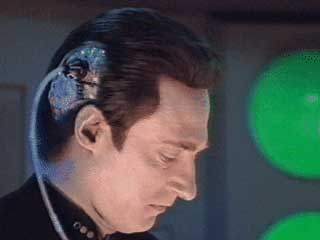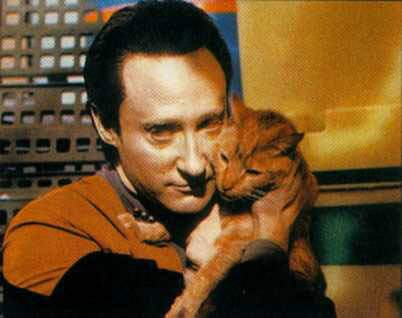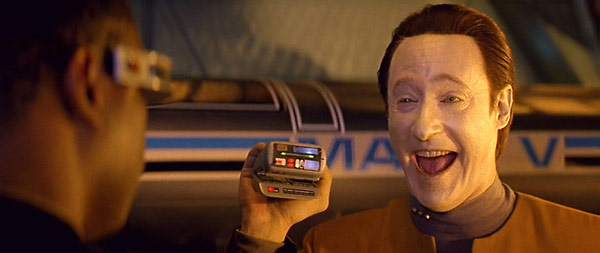Throughout the long history of fiction, androids and gynoids – artificial men and women – have been a common element.
When included as tertiary characters they are often symbols for ‘the other’. When treated as protagonists, they fill the tale with themes of the roles and definitions of humanity. Thus, this series is taking a close look at these artificial people. Today we’re looking at Data.

Data is the mechanical man in the Star Trek: The Next Generation television series, and its subsequent films.
He seems to parallel the purpose of Spock from the original series: filling the roll of the emotional outsider, a person who does not understand human emotions.
Literature uses these types of characters as a way to analyze the importance and use of human emotion, much in the way a story that focuses on a desert world is really about water.
The character was approached differently from Spock however. While Spock is a partly emotive person who wishes to become fully emotionless, Data is a partly emotive person, who strives to become more emotional. Data is a classic Pinocchio figure, and the plan from the very first episode of Star Trek: TNG was for him to become slowly more human through the course of the show. In proper dramatically ironic form, he achieves that humanity finally in his last acts before death.
In the canon of the story-world, Data was crafted in 2338 by Dr. Soong, a roboticist who specialized in positronic brains. After failing to achieve results as part of the robotics community, Soong left Earth to conduct his research on Omicron Theta.
Eventually, he created 4 positronic brains (the canon is not actually conclusive on that, as some episodes mention more Soong-type androids than just the four), each of which he deposited into androidal machine bodies. All but one, he made to resemble himself. Data was the last of those, and as he was the only Soong-type to achieve true sentience, he was the most successful, despite their having been one ‘more advanced’ model, which Soong had crafted to replace his late wife.
Data was raised on in the colony, as if he was a child, having to learn on a blank slate, much like a real person, except that Soong had to occasionally reprogram him in order to make him more human, as he was at first incapable of understanding things like etiquette or the importance of clothing in society. These small and frequent adjustments are what led Data to become a very personable android, and by the time the audience meets him in Farpoint, he is a very well-mannered robot.

Starfleet located Data in a deactivated state on Omicron Theta in the year 2338. His last memories were of being shut down so that his programming could be fine-tuned two years earlier. The colony in which he was living was destroyed by an alien entity, and the entire population was killed or fled, the fate of Soong unknown.
He fought to be admitted into Starfleet academy, wishing to serve those who had rescued him from permanent deactivation in the rubble of Omicron Theta. He convinced Starfleet command to give him a chance, and in four years he graduated with honors.
He spent the next 19 years rising through the ranks of Starfleet, earning commendation after commendation. If he had been human, his record would have earned him command of his own vessel, but command was not willing to trust him quite that far yet, so they placed him as Operations Officer (a role once held by Spock) and Third in Command of the Enterprise-D under Jean-Luc Picard.
Not long after, the ship stopped as Omicron Theta on their way to another mission, and on scanning the site of the former colony, the crew found another android, of the same likeness as Data, but an earlier model. This “bother,” Lore, became a core part of Data’s conflicts throughout the rest of the series.
Lore was everything Data could not let himself be, an uneducated, uncultured, selfish machine. When Soong is discovered to be alive years later, and to have been working on an ‘emotion chip’ intended for Data, Lore steals the chip for himself, killing Soong in the process. When Data retrieves the chip from him, it’s damaged, and Data waits a full year before trying it out on himself.
The initial installation of the ship nearly cripples Data, as his new emotions overwhelm him, an apparent result of the damage to the chip, but soon Data learns to deactivate the chip at will, which, while lessening his humanity, allows him to function as a competent officer again.

He served on the Enterprise-D for the 6 years of that ship’s commission, then in the same capacity on the Enterprise-E until his death in 2379. During that time, he was forced to take command on several occasions, always rising to the occasion in splendid fashion.
In the end, he sacrifices his own life to save the rest of the ship’s crew in the ultimate unselfish act. His value to the crew in all that time is immeasurable, as he often saves the day with his skills and biological immunities.
There is a non-canon comicbook which depicts the later ‘resurrection’ of Data, when his memories are downloaded into another early model Soong-type android, along with his uniquely damaged emotions chip, whereby he is reinstated as a Lieutenant Commander in Starfleet, and eventually earns his own command. However, the actor who plays the part of data in all of the television and theatrical release, has stated that a canon return of the character is unlikely due to his own physical age.
Data’s struggle for humanity takes many turns over the seven seasons of the show, and the subsequent films. At one point, he even uses his internalized knowledge of robotics to build himself a daughter in an attempt to create an emotional connection (ultimately she has fatal programming flaws).
His clear struggle and his obvious innocence make him one of the easiest characters on the program to root for, while simultaneously his inhumanity makes him difficult to relate with. This combination created a dynamic and thoroughly likeable character. It could be said that his story epitomizes the Pinocchio figure better than Pinocchio himself, who was perhaps more relatable, but not entirely likeable (a topic for a later article in this series).
Check back tomorrow, when our featured artificial person will be Tik-Toc of Oz. If you have an idea for an android or gynoid we could feature, let us know in the comments.






